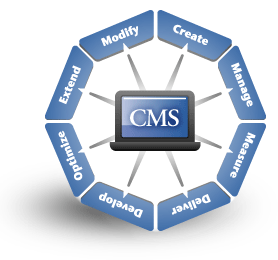A content management system (CMS) is a software system that provides website authoring, collaboration, and administration tools designed to allow users with little knowledge of web programming languages or markup languages to create and manage website content with relative ease. A robust WCMS provides the foundation for collaboration, offering users the ability to manage documents and output for multiple author editing and participation.
CMS: A working definition
A content management system (CMS) supports the creation, management, distribution, publishing, and discovery of corporate information.
It covers the complete lifecycle of the pages on your site, from providing simple tools to create the content, through to publishing, and finally to archiving.
It also provides the ability to manage the structure of the site, the appearance of the published pages, and the navigation provided to the users.
Note that we are focusing on the most common use of a CMS: to manage web content. In some circles, these systems are therefore called web management systems (WMS).
Content management systems can be much broader than this, but we won’t touch upon these aspects until later.
The history of WCMS
In the modern world, we are all used to the idea that we can create our own documents – but if you go back 15 or so years – the only way you could create a website was by understanding ‘HTML’ – which few did. Products like Dreamweaver and Frontpage were not around – which meant that pretty much if you wanted to have a website (internet, extranet, intranet) then you needed someone with technical skills to write it – but not only that – once they had written it you still needed someone technical to change it – as it involved reading HTML code to determine where to add content.
Web Content Management today
There are very few web content management tools on the market today that talk only about the process of creating and managing content. As the web surfers have evolved to demand enhanced user experiences – driven by using tools like ebay and amazon – and the dominace of social tools like LinkedIn, Twitter and Facebook in driving what users ‘expect’ as an enhanced journey – so too have the WCMS tools. Beyond simple web content management you will often hear terms such as ‘web experience management’ or ‘content in context’ to signify that web CMS tools have evolved to be able to provide a user experience that is ‘personalised’ to the visitor.
Examples of Some Major Web CMS
- WordPress is the most popular content management system. It originated as a blogging CMS, but later evolved into a fully-fledged CMS.
- Joomla! is a popular content management system that can be used to easily create and edit webpages, but it is more complex than WordPress.
- Drupal is the third top used CMS and originated before WordPress and Joomla. It is more difficult to learn and understand than the above two CMSs, but is the most secure. It powers the White House site.
How to Check CMS of the Website
This is where on-line CMS detectors come in handy. I have tested four of these analyzers on websites of 11 major CMS vendors with the following results:
| CMS Analyzer | Effectiveness |
| W3Techs (w3techs.com/sites) | 73% |
| BuiltWith (builtwith.com) | 64% |
| Wappalyzer (firefox add-on) | 36% |
| CMS Detector (detectcms.com) | 27% |
| CMSeye (cms.targetinfolabs.com) | 27% |

